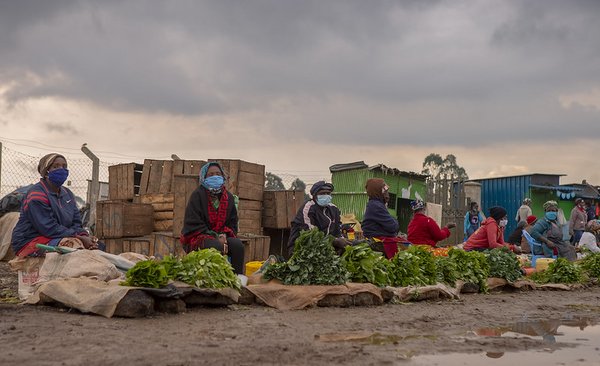- Share this article
- Subscribe to our newsletter
Covid-19 reveals all weaknesses of food systems
To determine the impact of the pandemic on food systems, Swiss Development Cooperation - Agriculture & Food Security Network - organised an e-discussion and a concluding webinar which revolved around the issue of City Region Food Systems (CRFS) Governance under COVID-19.
From the 4th to the 26th May 2020, more than 60 participants actively took part in the event, while a total of 147 people from around 50 countries had registered for it. The discussions were structured by three crucial questions about the situation on the ground, the pathways for action and the lessons learnt for further action. The questions were dealt with in over 85 contributions.
During the first week, testimonies from participants about what was happening in terms of food systems in the fields were collected. Participants shared insights about the situation in Afghanistan, Bangladesh, Bolivia, Brazil, Burkina Faso, Cambodia, Colombia, the Horn of Africa, India, Kenya, Laos, Malawi, Mali, Nepal, Nicaragua, Pakistan, Somalia, South Africa, Switzerland, Uganda, Vanuatu, Vietnam, West Africa in general, West Bank/Gaza and Zimbabwe. This gave the webinar a rich overview of disruptions caused by COVID-19, on the basis of which initial ideas for possible adjustments could already be discussed.
While, as a matter of course, the arising challenges could differ depending on the specific regional context, most of the issues were common throughout the regions. The restrictions on movement and closed borders are making access to land more difficult, input products are harder to obtain, labour forces can’t be recruited and sale options like markets have been closed. All this is resulting in widespread price increases for consumers, while at the same time the prices for producers are falling.
A loss of rural and urban livelihoods along the agricultural value chains, but also in other sectors such as tourism or manufacturing, can be a consequence of this recent development. Similarly, many participants reported products increasingly being wasted, especially fresh products requiring rapid transportation and/or storage logistics. Thus, for a rising number of people, food security can’t be guaranteed, and the current health crisis combined with the emerging global recession could disrupt the functioning of food systems.
Pathways for action
The pathways for action explored during the second week of the e-discussions opened the floor for talks about the adjustments that have already been made and for considering guidelines for further action. One idea brought up is the development of digital tools to deploy alternative marketing and product distribution strategies. Further notions include an interactive map tracing beneficiary households and farmer diaries which can be updated online.
Another idea is investing in logistics, storage and local processing. One example would be onion production in Burkina Faso, which is facing serious losses. Through investing in storage and conservation facilities, serious consequences could be averted, and the producing families and companies would be more flexible and end up with increased sales revenue.
On a more general level, the regional coordination and collaboration of different levels of governments and the importance to allow farmers, traders, transportation, transformation and sellers both from the formal and informal systems to operate with safety measures were also discussed as a core measure of an appropriate response.
Systemic investments in food systems and functional value chains
The last week of discussions focused on the lessons learnt, in the course of which participants talked about their conclusions in three webinars organised in three languages. The importance of systemic investments in food systems and the good communication along the agricultural value chains were emphasised, as was the importance of re-thinking food systems as more territorial to be more resilient and better adapted to local conditions and needs. Indeed, as discussed with the participants, policies, laws and state budgets still favour export-oriented agribusiness and should be reoriented towards local food systems or local, small-scale production.
Broadening the nexus approach in the context of COVID-19 and re-designing the global food system has a big potential to increase resilience to all kinds of crises which are likely to occur more frequently in the future. And as a matter of fact, in many places, the COVID-19 pandemic really only adds to already existing challenges such as pests, natural hazards, pre-existing food insecurity or already weak logistics for agricultural markets and political instability. Thus a coordinated response across sectors and borders is needed both to mitigate the immediate impacts and to reshape food systems so that they support healthy and sustainable diets for all.
Lou Curchod, Swiss Development Cooperation (SDC), Berne, Switzerland
Lou.curchod@eda.admin.ch
Luc Ruffieux, Swiss Development Cooperation (SDC), Berne, Switzerland,
Luc.ruffieux@eda-admin.ch
For more information:
COVID-19 and Food Systems - Special Page on Shareweb of the SDC Agriculture and Food Security Network, on which you find the link to the results of the dialogue in English, French and Spanish





Add a comment
Be the First to Comment